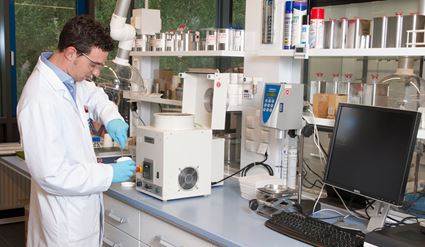
The Glue Talk Blog

Today’s customer demands even more customization and increased variety—all while wanting costs low and quality up—calling for “adaptation of existing lean techniques and exploration of the new waste-free solutions that go far beyond manufacturing,” according to Lean Business Systems and Beyond. H.B. Fuller is primed to offer lean process improvements that thereby provide greater energy and material efficiencies for its customers.
Because adhesive solutions are an integral part of nearly every kind of finished good in the marketplace, H.B. Fuller is committed to continuous adhesive innovation that helps deliver products that are lighter, stronger, and thinner. Some examples of this include light materials in furniture production (“lightweight”), including the H.B. Fuller Rakoll® woodworking adhesives that contribute to the stability of materials in addition to their performance, and the use of reactive hot melt adhesives, which enable more efficient manufacturing by reducing waste and improving throughput.
Maximizing Process Improvements to Enhance Adhesive Usage
At H.B. Fuller, we pride ourselves on our superior level of expertise, our first-rate technical support, and our spirit of collaboration that permeates throughout the entire company. This is particularly valuable as we continually work to improve our processes in order to maximize adhesive usage and leverage our customers’ resources.
Process improvements is no more prevalent than in our lean manufacturing process. Lean manufacturing, according to Lean Business Systems and Beyond, “means that value is created only when all the resources flow through the system. If the flow is stopped, no value but only costs and time are added.” This ideology “has proved to be one of the most successful and most powerful production business systems over the last decades. Its application enabled many companies to make a big leap towards better utilization of resources and thus provide better service to the customers through faster response, higher quality, and lowered costs.”
Adhesive solutions, which are used in a variety of applications, including flooring, doors and recreational vehicle sidewalls, furthermore have a high green strength, enabling customers to move from lamination to secondary manufacturing without interruption. The result is reduced cycle times, increased output and energy conservation. Considering that the weight of a product has an impact on its CO2 footprint during transportation, weight reduction also contributes to the reduction of the CO2 footprint of furniture.
Durable adhesive bondings also contribute to longer product life and deliver strength and flexibility under challenging circumstances, such as humidity, physical impact or high temperature fluctuations.
A Key Market Strength Towards Efficiency and Sustainability — Technical Support
These process improvements also further H.B. Fuller’s sustainability commitment as they enable optimization of facilities’ operations. Additionally, process improvements enable H.B. Fuller to further realize one of its key market strengths: the ability to utilize its technical support team members in close collaboration with those involved with process improvement.
Since H.B. Fuller’s specialized support is catered to each customer’s products and business idiosyncrasies, it is provided before, during, and after the sales process, including:
- woodworking applications, either with new or existing products
- in loco at customers’ production sites or at the Lüneburg Adhesive Academy
- in diverse areas, such as:
- machinery usage and potential adjustments needed
- application conditions and troubleshooting
- substrates composition and type
- overall production process improvement
At H.B. Fuller, we understand our woodworking customer production process, enabling us to work with our customers to optimize adhesive consumption and reduce the quantity of parts, the work in progress, and the total cycle time. We successfully recommend the best adhesive to achieve reliable bonds and reduce the number of component defects.
Lean manufacturing trends, coupled with H.B. Fuller’s internal zero defects policy, is the process adaptation of the future. To learn more about how H.B. Fuller can help you realize areas of your organization that can be lessened, visit www.hbfuller.com/wood-adhesives or contact us today!
If you are attending this year’s LIGNA (May 22-26 in Hanover, Germany), stop by Booth B21 in Hall 17 to learn more!
Blog Categories
Blog Categories
Archive
- 2024
- 2023
- 2022
-
2021
- January (3)
-
February (7)
- Celebrating Exceptional Service During COVID-19 Complications
- Cyanoacrylates: What They Are and What They Do
- Innovative two-shot bookbinding adhesive
- Make a Difference 2020
- Problem Solving: Paper Straws in Drinking Beverages
- Stronger straws sustainable future
- Substances of Interest in Disposable Absorbent Hygiene Products
- March (4)
- April (4)
- May (4)
- June (5)
- July (2)
- August (5)
- September (2)
- October (1)
- November (3)
- December (2)
-
2020
- January (4)
- February (2)
- March (3)
- April (4)
- May (3)
-
June (7)
- Community Support in the Era of Coronavirus
- HBFuller Employee Creates Face Shields with 3D Printer
- Improved Packaging Integrity and Greater Customer Satisfaction
- Liquid-Resistant Paper Straws
- What is a Sealant?
- What Is the Future of Commercial Disinfectants?
- Winning over consumers with e-commerce packaging solutions
-
July (6)
- Employees Take Action to be Part of Healing and Growth
- Gain a competitive advantage with packaging adhesive solutions
- HB Fuller Company Foundations Commitment to Communities
- Packaging Solutions for the South African Agriculture Market
- Supporting Organizations That Provide STEM Education for Youth
- Where Does Sustainability Stand Amid COVID-19
- August (3)
- September (2)
- October (4)
- November (2)
- December (4)
